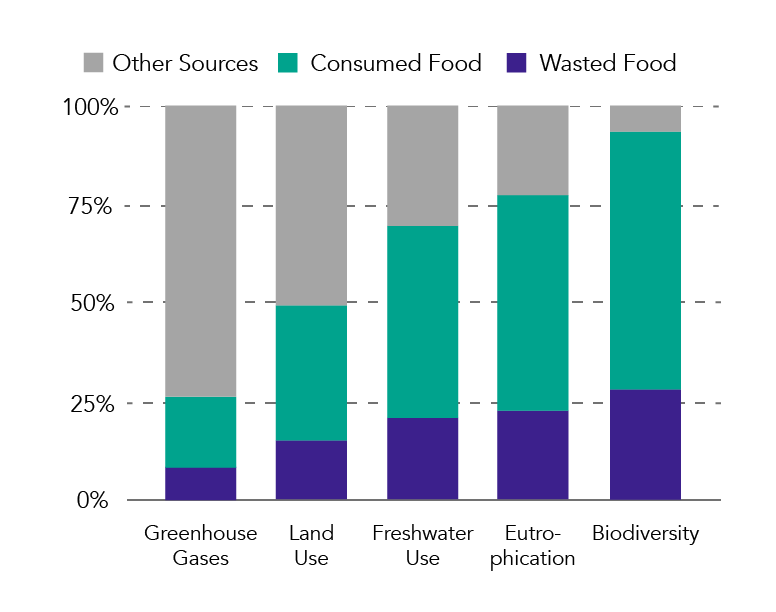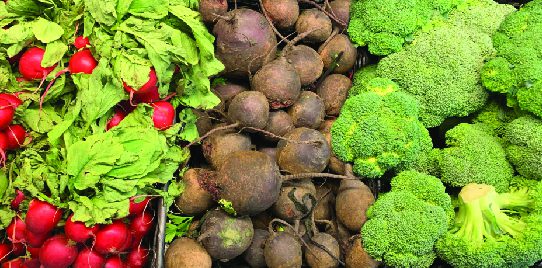On the second annual International Day of Awareness of Food Loss and Waste, we are excited to launch Multiscale RECIPES for Sustainable Food Systems. From farm to supply chain issues to consumer behavior and in some parts of the world, a lack of refrigeration, wasted food is a challenge spanning from the local to the global, with diverse challenges in every region of the world. In the United States, 40 percent of food produced is never eaten, which represents waste in the forms of lost resources and pollution from food production, economic costs to businesses and households, and decreased food security. Wasted food and related food scraps create a complex organic waste stream that, in turn, leads to immense climate and ecological impacts.
National health, security, prosperity and welfare depend on sustainable, equitable, and resilient food systems. Addressing the problem of wasted food will lower greenhouse gas emissions and improve food security. Based on prior research, the sustainability implications of wasting food in the United States include the annual misuse or loss of an estimated 30 million acres of cropland, 4.2 trillion gallons of irrigation water, 780 million pounds of pesticides, and 1.8 billion pounds of nitrogen fertilizer, along with over 1,250 calories and nearly 1 pound of food per capita per day. The loss of under-consumed nutrients is also considerable; for example, our prior research estimates that the US discards enough dietary fiber to meet the Recommended Dietary Allowance for 74 million adult women.

There are many definitions of food waste. According to the U.S. Environmental Protection Agency, wasted food describes food that was not used for its intended purpose, even if we still get value from it. This definition includes high-quality, nutritious surplus food that can be recovered to feed people. It also includes food that is not edible and should be recycled by composting, anaerobic digestion, or other new technologies being developed.
The U.S., in parallel with the goals set forth by the United Nations, aims to halve food waste by 2030. Many local governments in the U.S. have also signed onto this goal. Along with the U.N. goals, in the United States, there is widespread support for reducing food waste.
Multiscale RECIPES for Sustainable Food Systems is being launched through a $15 million, five-year project funded by the National Science Foundation with 14 institutions and over 40 researchers that will work across academic disciplines and with community members, front-line workers in different food industries, and relevant stakeholders in non-profit, government and private sectors to bring sustainability and resilience to America’s local, regional and national food systems.
Our work will help find, strengthen and adapt data-driven solutions for how food waste can become a resource: for example, by taking a systems approach to preventing wasted food and better connecting resources to people; diverting high-quality surplus food that otherwise would be wasted and getting it to food-insecure communities; recycling residual carbon and nutrients back into agricultural production; and converting inedible food scraps into bioenergy that powers regional infrastructure.
RECIPES includes researchers from regions representing major fruit and vegetable (California), meat and commodity crop (Illinois, Indiana and Ohio), and milk and food processing (New York) hubs. The network includes urban regions, like Rochester, Baltimore, Washington D.C., Chicago, Columbus, and Baton Rouge, cities that all grapple with food system inequalities and that are poised for economic transformations that can be realized through food system innovations. The network also includes strategic partners already deeply engaged on food waste solutions, such as the World Wildlife Fund, Natural Resources Defense Council, and Rethink Food Waste through Economics and Data (ReFED).
RECIPES will create an online, publicly accessible database on wasted food in the U.S. that will fill a critical gap in food systems research. Data will be generated, collected, and integrated and come from areas that intersect with food systems including health, the environment, the economy and transportation, and more.
Projects include imaging science to measure food types and quantities; computer modeling to predict national food flows across the country; understanding wasted food through an environmental justice lens; and ethnographic studies with communities to gain insights on the relationships between people, food and culture.
The project has several robust educational components to involve graduate and undergraduate students in research, elementary schools, community outreach and more. One outcome will be the creation of the first undergraduate student science journal on food systems. In addition, we will be developing a new, rigorous assessment to examine diversity, equity, and inclusion efforts across the project and that can serve as a model for future research networks.
We incorporate the process of human-centered design, which puts the people most affected by a problem at the center of the process to better understand the problem and to co-design ideas to address it. This is done by facilitating a design process to engage diverse perspectives, disciplines and stakeholders.
We want to thank you for your interest in our network and would love to engage with you in a multitude of ways. Check out our website for more information, and visit the“Get Involved” page to sign up for our listserv.
Brian, Callie, Celeste, Roni, Sauleh
